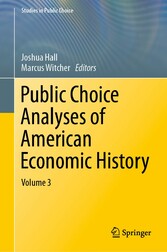Suchen und Finden
Service

Public Choice Analyses of American Economic History - Volume 3
Joshua Hall, Marcus Witcher
Verlag Springer-Verlag, 2019
ISBN 9783030113131 , 209 Seiten
Format PDF, OL
Kopierschutz Wasserzeichen
Geräte
Acknowledgements
6
Contents
7
Contributors
9
1 Club Women and the Provision of Local Public Goods
10
1.1 Introduction
10
1.2 History of Women's Clubs in the 19th and Early 20th Century US
12
1.2.1 Religious Roots and Community Support
13
1.2.2 Provision of Local Public Goods and Club Goods
14
1.2.3 Political and Regulatory Influence
15
1.3 The Theory of Goods that are Neither Public Nor Private
16
1.4 The Organization of Collective Action by Women's Clubs
18
1.4.1 Overcoming the Collective Action Problem
18
1.4.2 Providing Local Public Goods within a Polycentric System
22
1.5 Conclusion
25
References
26
2 Samuel J. Tilden, Iron Money and the Election of 1876
29
2.1 Introduction
29
2.2 A Protégé of Van Buren
29
2.3 Iron Money
30
2.4 Panic of 1873
32
2.5 Iron Money During the Election of 1876
33
2.6 The Money Issue During the Election of 1876
35
References
36
3 The Impact of Decentralization on Municipalities: Evidence from the Municipal Home Rule Movement
38
3.1 Introduction
38
3.2 The Evolving State-Municipal Relationship
40
3.2.1 Categorizing Constitutions: Dillon's Rule Versus the Cooley Doctrine
40
3.2.2 Home Rule
42
3.3 The Impact of Government Structure on Outcomes
45
3.4 Empirical Strategy
47
3.5 Data
48
3.6 Analysis
50
3.7 Conclusion
55
References
56
4 Organized Opposition: The Anti-Federalist Political Network
57
4.1 Introduction
57
4.2 The Contours of the Debate
60
4.3 The Role of Newspapers
63
4.4 Examining the Spread of Federalist and Anti-Federalist Literature
66
4.5 Comparing the Federalist and Anti-Federalist Newspaper Networks
68
4.6 Conclusion
75
References
76
5 Bootleggers and Baptists in the Passage of Federal Surface Mining Law
78
5.1 Introduction
78
5.2 The Economics of Regulation
78
5.3 History of Surface Mining Regulations
80
5.4 Coal Context
82
5.5 Coal Ownership Patterns
83
5.6 Topographical Differences
84
5.7 The Baptists and Bootleggers of SMCRA
84
5.8 Conclusion
86
References
87
6 Pro-consumer Legislation Supported by Elites: The Curious Case of the 1866 Post Roads Act
88
6.1 Introduction
88
6.2 Western Union as a Concentrated Interest
91
6.2.1 Government Favors Received by Western Union
92
6.3 1866 Post Roads Act as Pro-Consumer Legislation
94
6.3.1 Telegraph Market Contestability After 1866
95
6.4 Concentrated Interests Benefited from 1866 Post Roads Act
96
6.4.1 Non-New York Associated Press Newspapers Benefited from 1866 Post Roads Act
97
6.4.2 Ohio Republicans who Benefited from the 1866 Post Roads Act
98
6.4.3 Businessmen who Benefited from the 1866 Post Roads Act
99
6.5 Elite's Connections to Politicians who voted on 1866 Post Roads Act
100
6.5.1 Western Union's Opposition to the 1866 Post Roads Act
100
6.5.2 Senator John Conness of California Vote for the 1866 Post Roads Act
101
6.5.3 Ohio Republicans Support for the 1866 Post Roads Act
102
6.5.4 Ohio House Republicans Vote for the 1866 Post Roads Act
103
6.6 Conclusion
105
References
105
7 Economic History of the Relationship Between Congress and NASA: A Case Study of the Apollo Program
108
7.1 Introduction
108
7.2 History of the Apollo Program
109
7.3 Analysis of Relationship Between Congress and NASA
112
7.3.1 Congressional Dominance Theory
113
7.3.2 Exploratory Analysis
114
7.4 Conclusion
120
References
120
8 An Economic Interpretation of Rhode Island's 1788 Referendum on the Constitution
122
8.1 Introduction
122
8.2 The Origins of this Essay
126
8.3 Charles Beard and the Scholarly Debate
127
8.4 Political and Economic Context of the Rhode Island Referendum
130
8.5 Economic Analysis of the Rhode Island Referendum
135
8.6 Further Opportunities for Analysis of the Referendum
137
References
139
9 A Hard Day's Night: Provision of Public Evening Schools in the United States, 1870–1910
141
9.1 Introduction
141
9.2 A Brief History of Evening Schools
143
9.3 Public Evening School Provision
146
9.4 Evening School Provision and State Legislation
147
9.5 Within-State Variation in Evening School Provision
150
9.6 Determinants of Evening School Provision
150
9.7 Data and Econometric Framework
151
9.8 Results
154
9.9 Endogeneity Concerns and Instrumental Variable Results
157
9.10 Summary
160
References
167
10 Private Seeking of Private Monopoly in Early American Banking
170
10.1 Introduction
170
10.2 Rent Seeking, Briefly Stated
172
10.3 A Brief History of Pennsylvania Bank Chartering
175
10.4 Calculating the Social Costs of Monopoly and Rent Seeking
180
10.4.1 Qualification 1—Permanent Rents and Transitory Profits
184
10.4.2 Qualification 2—Monopoly and Monopsony
185
10.4.3 An Alternative Approach—Bank Charter Values and Tobin's Q
187
10.5 The State as Rent-Redistribution Mechanism
189
10.6 ``This Remarkable Democratic Period'': Popular Challenges to Rent Seeking
193
10.6.1 New York's Antimasonic Transformation
194
10.6.2 Pennsylvania Banking Policy Misses it Antimasonic Moment
198
10.7 Concluding Comments
201
References
206
Shop


